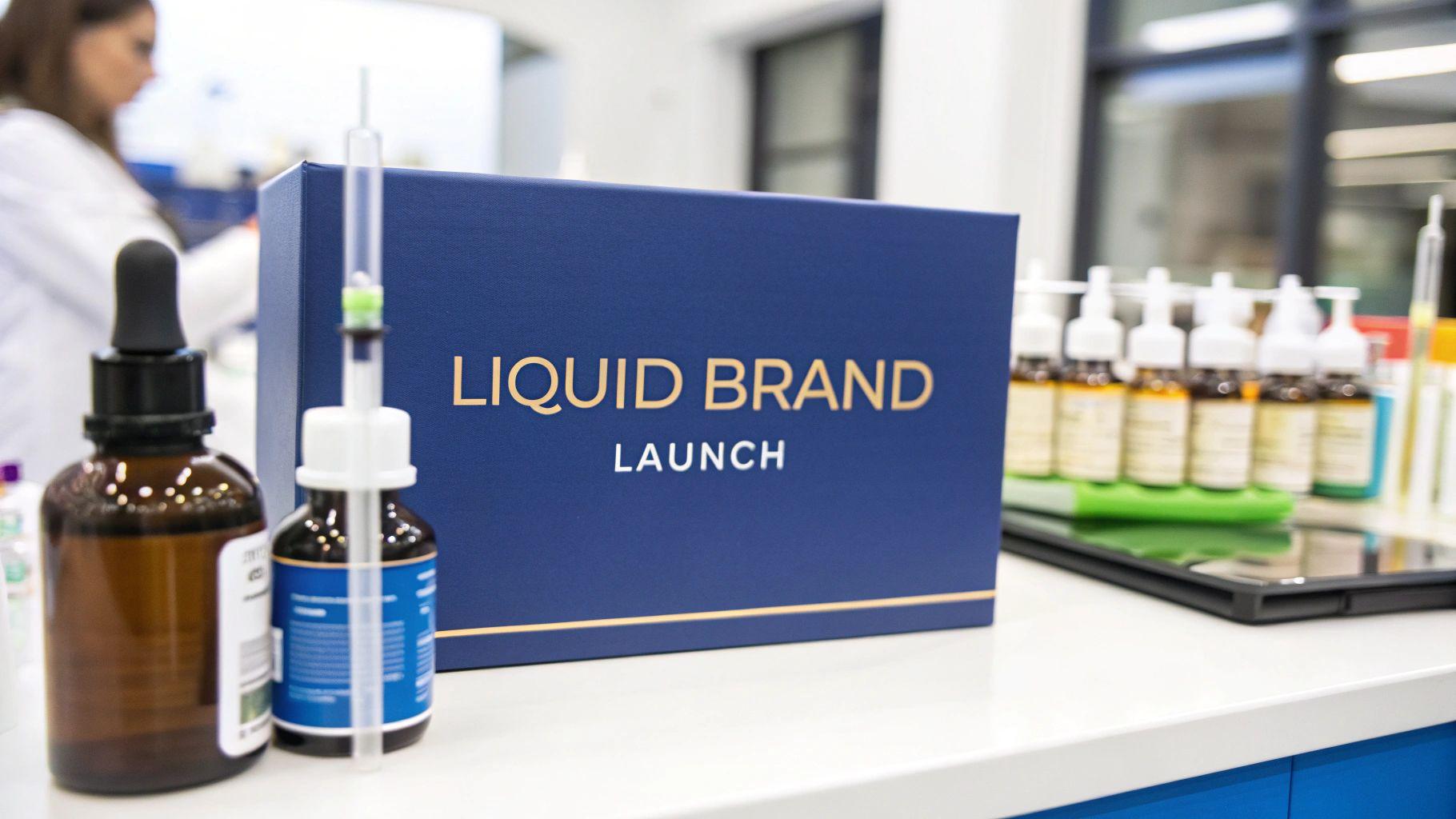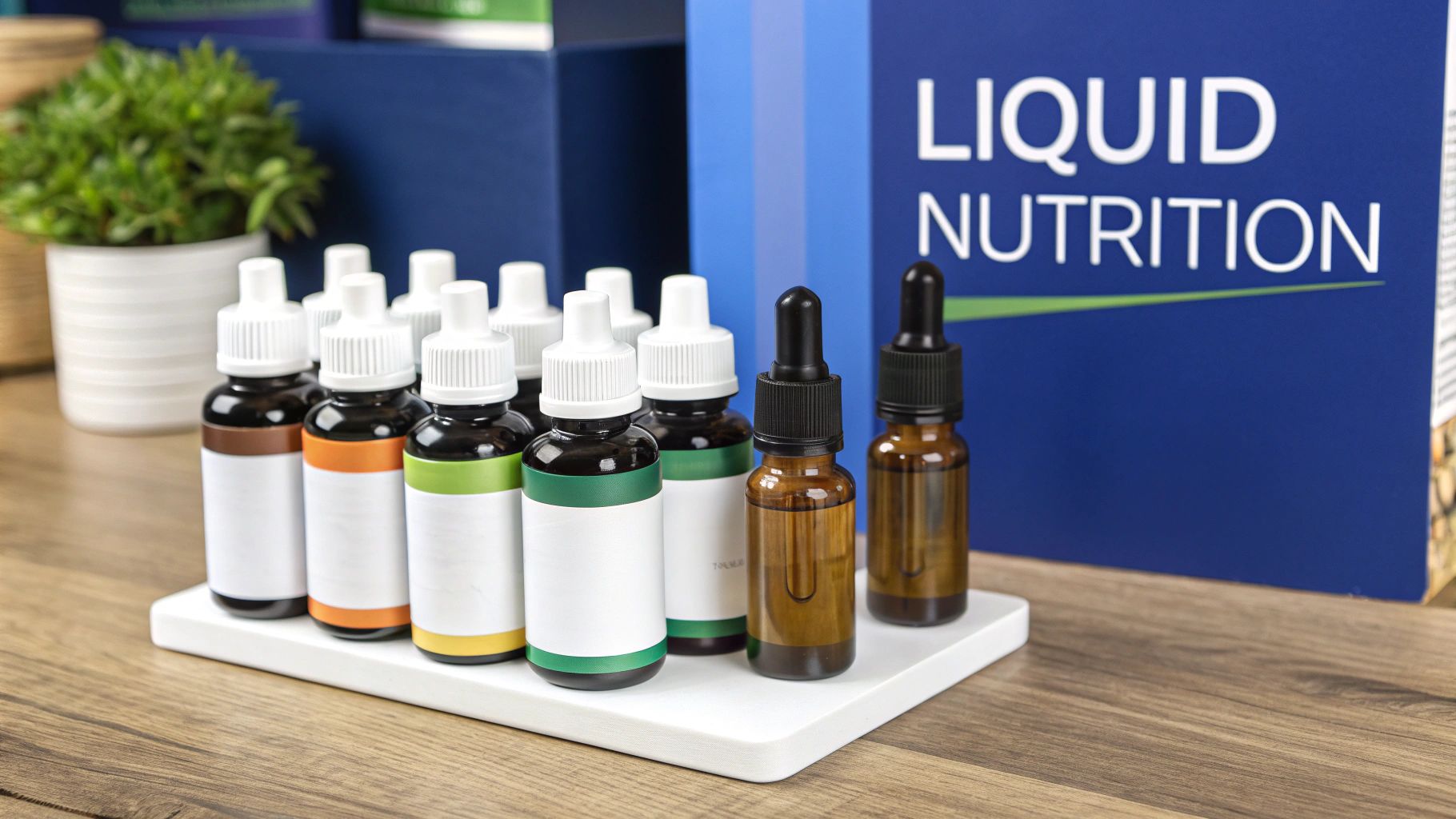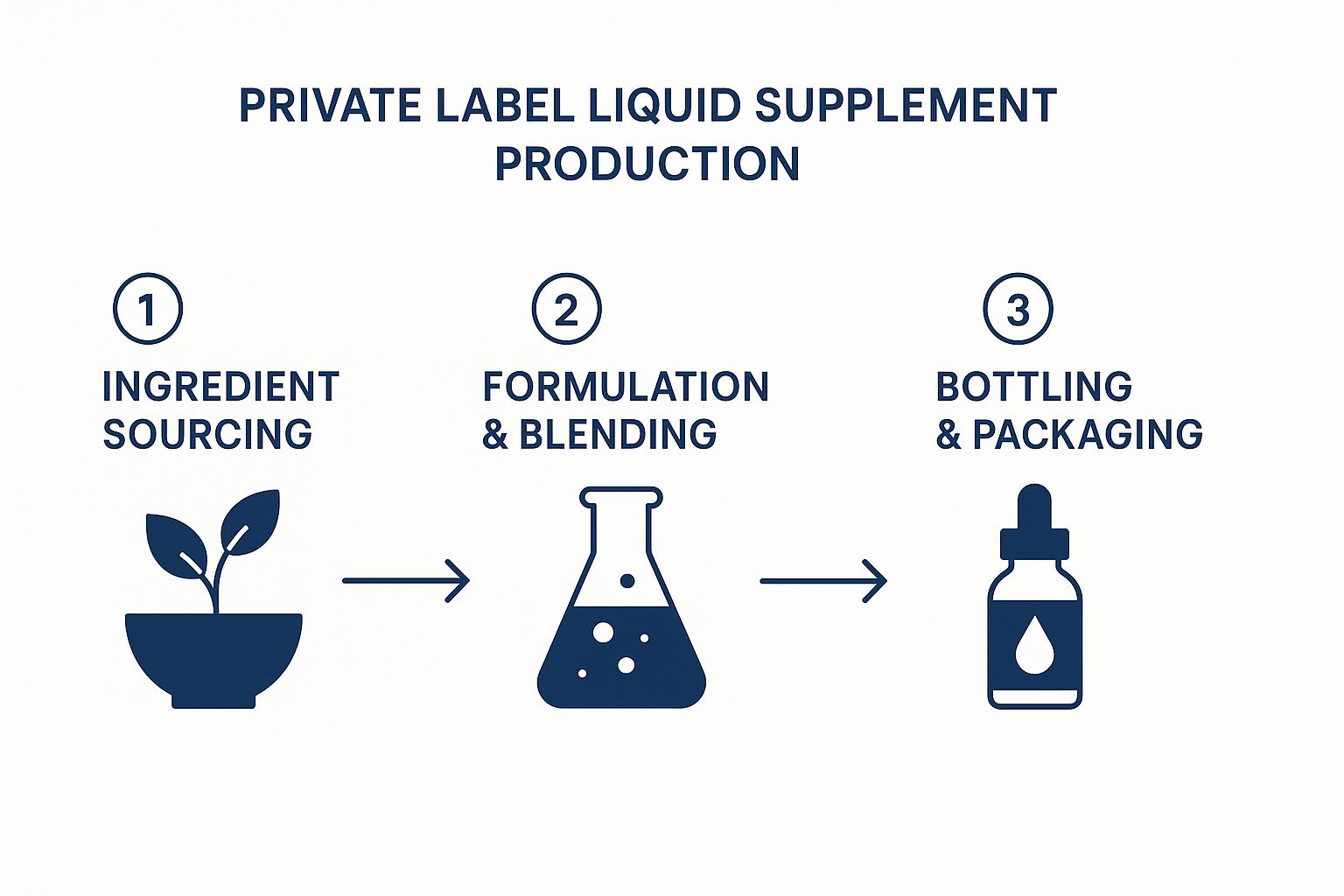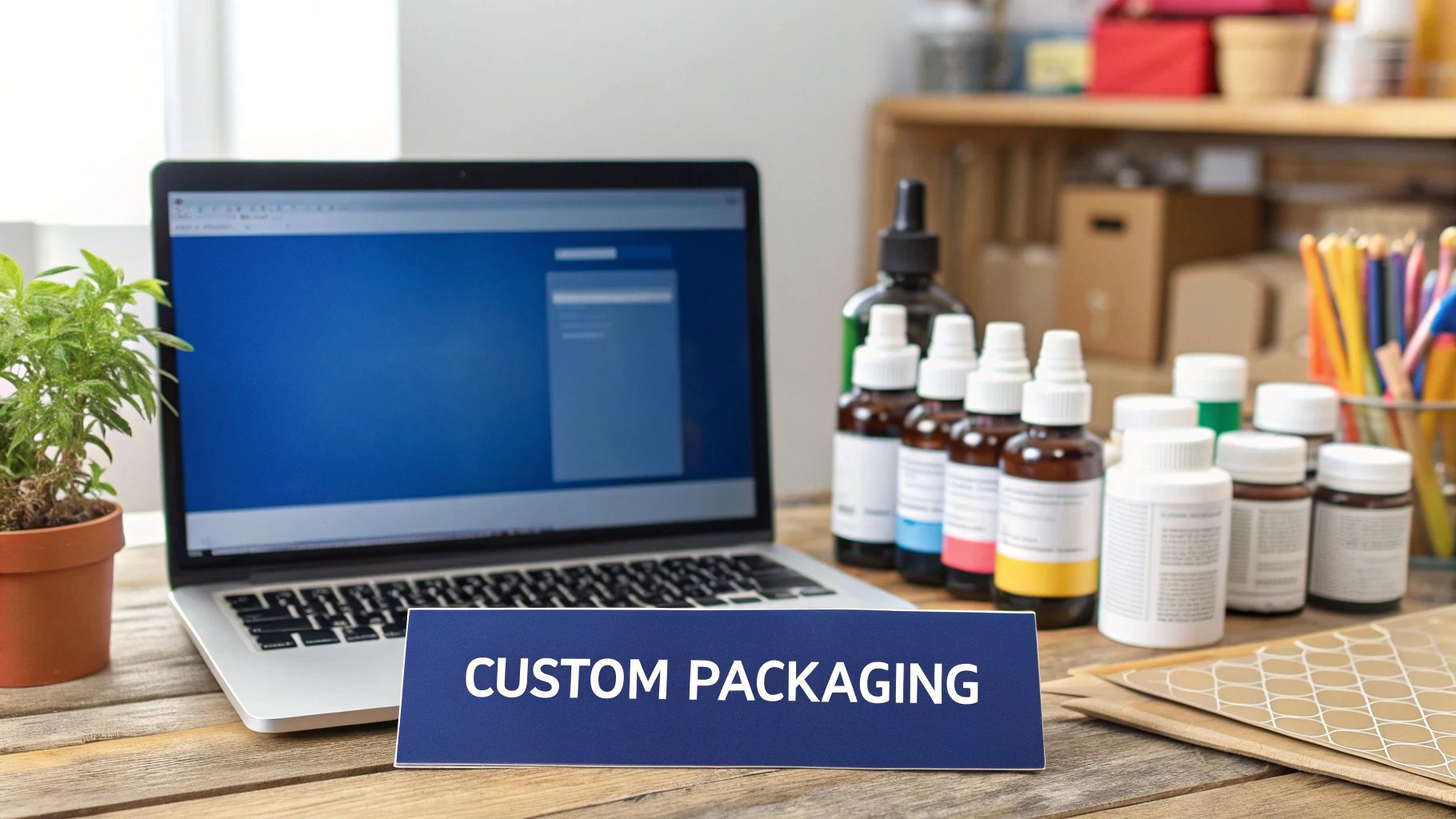Launch Your Private Label Liquid Supplements Brand
Your expert guide to starting a private label liquid supplements business. Learn how to find manufacturers, develop products, and build a successful brand.
 Get a Free Quote Today!
Get a Free Quote Today!So, you're thinking about launching your own supplement line. Private label liquid supplements are a fantastic way to break into the booming wellness market without the massive headaches and costs that come with creating a product from scratch.
Essentially, you're taking a proven, pre-formulated product and putting your own brand on it. This lets you skip straight to the good stuff—marketing and building a customer base—while a trusted manufacturing partner handles all the complex production work. Think of it as a strategic shortcut to getting a high-demand product on the shelves fast.
Why Liquid Supplements Are a Smart Business Move

The wellness industry is going through a major evolution. People are actively moving away from traditional pills and capsules, and this shift is creating a huge opening for brands that can deliver high-quality liquid nutrition. This isn't just some passing fad; it's a real change in how people are thinking about their health.
A big part of this change comes down to one word: bioavailability. Health-savvy consumers are more educated than ever, and they know that liquid formulas can offer much better absorption than solid supplements. This scientific advantage gives you a powerful selling point right out of the gate.
Then there's the sheer convenience. For busy professionals, parents, or anyone juggling a hectic schedule, a ready-to-drink supplement is a game-changer. No more struggling to swallow a handful of pills—a common complaint known as "pill fatigue." A quick, tasty dose of vitamins or herbs fits perfectly into a morning routine, making it easier for your customers to stick with their health goals.
The real opportunity for a new brand is to stop selling generic products and start solving specific problems. By focusing on a niche, you can create a loyal following that sees your product as an essential part of their wellness journey.
The Financial Upside and Market Growth
The numbers don't lie. The global liquid dietary supplements market was valued at approximately USD 29.2 billion in 2024 and is on track to hit around USD 53.1 billion by 2033. That’s some serious, steady growth, driven by a greater focus on health and a clear preference for supplements that are easy to take and digest.
This booming market is the perfect environment for new brands to thrive. With private label liquid supplements, you can jump into this multi-billion dollar industry without the crushing upfront investment in manufacturing plants, expensive equipment, and a team to navigate regulations. Instead, you get to lean on an established, certified operation to bring your brand to life.
A few key factors are really pushing this market forward, and they all work in your favor as a private label brand.
Key Market Drivers for Liquid Supplements
The surge in popularity for liquid supplements isn't random; it's fueled by distinct consumer needs and preferences. Understanding these drivers is key to positioning your private label brand for success.
| Market Driver | Impact on Private Label Brands |
|---|---|
| Higher Bioavailability & Efficacy | Consumers are willing to pay more for products they believe work better. You can market your supplements as premium and effective, justifying a higher price point. |
| Consumer Convenience | Liquid supplements cater directly to the "on-the-go" lifestyle. This makes your product an easy choice for busy individuals looking for simple health solutions. |
| Addressing Pill Fatigue | A significant part of the market, including children and older adults, struggles with pills. Your liquid product solves a real problem, opening up a large and often overlooked customer base. |
| Flavor & Formulation Versatility | Unlike pills, liquids can be flavored and customized. This allows you to create unique, great-tasting products tailored to specific niches like cognitive function or athletic performance. |
These trends show a clear move toward more user-friendly and effective wellness products, creating a solid foundation for any new brand in the liquid supplement space.
Ultimately, the debate over which form is "better" is a huge part of consumer education. When you understand these advantages, you can position your brand to win. If you want to go deeper on this, our guide on whether liquid vitamins are better than pills is packed with valuable insights.
Launching a private label liquid supplements brand isn't just a smart business decision—it's a strategic move that perfectly aligns with where the modern consumer is headed.
Choosing Your Ideal Manufacturing Partner
Picking a manufacturing partner is single-handedly the most important decision you'll make for your private label liquid supplements brand. This isn't just about finding a company to fill bottles; you're building a strategic relationship with a team that needs to be a true extension of your own. Your manufacturer's quality, expertise, and reliability directly impact your product's safety and, ultimately, your brand's reputation.
Forget the generic advice. You need a partner who gets the nuances of liquid formulations—everything from stability and taste to bioavailability. The right partner won’t just take your order and send an invoice; they'll actively contribute to your success.
Decoding Certifications and Quality Standards
When you start looking at potential partners, you'll be swimming in a sea of acronyms. Knowing what they mean is your first line of defense in protecting your business and your customers.
-
GMP (Good Manufacturing Practices): This is non-negotiable. GMP certification means a facility follows strict, documented procedures to make sure every single batch is consistent, safe, and pure. It’s the absolute baseline for quality in the supplement world.
-
FDA-Registered Facility: This means the manufacturer is on the Food and Drug Administration's radar and is subject to their inspections. While the FDA doesn't approve dietary supplements before they go to market, a registered facility is playing by the rules and operating transparently.
-
Third-Party Testing: A manufacturer who is genuinely confident in their work will have their ingredients and final products tested by an independent, third-party lab. This gives you an unbiased confirmation of potency and purity, proving that what's on your label is actually in the bottle.
These certifications aren't just logos for their website; they are your proof that a partner is committed to the highest standards. The journey from raw ingredients to a finished liquid supplement involves several critical stages, and each one demands precision and tight quality control.
This graphic breaks down the typical production flow.

As you can see, a high-quality finished product is the sum of many excellent parts, starting with sourcing premium raw materials. This is exactly why you have to vet a manufacturer's entire process, not just what they can do at the finish line.
Questions to Ask a Potential Manufacturing Partner
Once you have a shortlist of certified candidates, it's time to dig in. Your goal is to get a feel for their specific experience with private label liquid supplements—not just supplements in general. Liquids are a different beast.
Don't be shy about asking tough, specific questions. A great partner will appreciate your diligence and give you clear, transparent answers. If they're vague or evasive, consider it a massive red flag.
Show up to your first calls prepared with questions that go beyond just the price per bottle.
Key Questions for Vetting Manufacturers:
- What’s your experience with liquid formulas like mine? Ask them for specific (non-proprietary, of course) examples. Do they specialize in herbal extracts, complex vitamin blends, or mineral suspensions?
- Can you walk me through your quality control process at each stage? You want to hear about raw material testing, in-process checks, and final product analysis.
- What are your Minimum Order Quantities (MOQs)? You need a partner whose MOQs fit your startup budget and realistic sales forecasts. An MOQ that’s too high can sink a new brand with dead inventory.
- What kind of R&D and formulation support do you provide? A top-tier partner can be invaluable here, helping you refine your formula, dial in the taste, and improve stability.
- How do you handle ingredient sourcing and supply chain transparency? Can they provide a Certificate of Analysis (COA) for every single ingredient they use?
Finding the right team to bring your vision to life is a detailed process. To get an even deeper look into this critical step, our guide on nutraceutical contract manufacturing offers more context on building a rock-solid partnership. A great manufacturer does so much more than fill bottles; they provide the operational backbone that lets your brand truly grow.
Creating a Market-Ready Product Formula

This is where the magic really happens—turning a brilliant idea into a physical product that people will actually use and love. A successful formula isn't just about throwing a few trendy ingredients together. It’s about creating a targeted solution for a specific person with a specific problem. Here, you’ll move beyond the general concept of private label liquid supplements and start building something that creates trust and repeat customers.
First things first: you have to get laser-focused on your target audience. Who are you really trying to help? A generic "health-conscious adult" just won't cut it. You need to get granular.
- Are you creating a product for millennial professionals battling daily stress and burnout?
- Maybe your ideal customer is a new mother who needs targeted postpartum nutritional support.
- Or perhaps you're aiming at active seniors looking to support joint mobility and keep their minds sharp.
Each of these groups has completely different needs, frustrations, and goals. The more specific you can get, the easier it will be to craft a formula that feels like it was made just for them.
Finding Your Niche and Unique Selling Proposition
Once you know exactly who you're talking to, you can build a powerful Unique Selling Proposition (USP). This is the single biggest reason a customer should pick your product off a crowded shelf—virtual or physical. A strong USP is about the specific outcome you promise, not just the ingredients inside.
Think of it this way: a generic energy supplement is a dime a dozen. But a "caffeine-free afternoon focus blend for creatives"? Now you've carved out a specific corner of the market. This kind of focus makes your marketing infinitely more effective because you're speaking directly to a person's real-world problem.
A great way to start is by seeing what’s already out there and getting traction. Look at trending ingredients, but always view them through the lens of your specific audience.
Example Scenario:
Let's say you're targeting remote workers who are hitting that all-too-familiar wall of mental fatigue. You could research ingredients that directly address their pain points:
- Adaptogens like Ashwagandha or Rhodiola for managing stress.
- Nootropics like L-Theanine or Lion's Mane for promoting focus and clarity.
- B-Vitamins to help with sustained energy, minus the jitters from caffeine.
Suddenly, you have an ingredient profile that tells a compelling story and solves a real problem. This is precisely why private label liquid supplements are gaining so much market share. Brands can offer these tailored products to build intense loyalty. With hectic lifestyles and a rise in chronic health issues, consumers are actively looking for targeted solutions like liquid supplements packed with antioxidants, omega-3s, or brain-health nutrients. You can discover more insights about liquid supplement market drivers at Straits Research.
Collaborating with Your Manufacturer on Formulation
This is where your manufacturing partner’s R&D team becomes your greatest asset. These are the experts who can take your vision and turn it into a stable, effective, and, importantly, great-tasting liquid. A good partner doesn't just take your order; they work with you to refine and perfect the formula.
Key Takeaway: Treat your manufacturer's R&D team as a strategic partner. Come to them with your audience research and ingredient ideas, but be open to their expert guidance on dosage, stability, and flavoring.
They can give you priceless feedback on things like:
- Ingredient Synergy: Making sure all the active ingredients play nicely together and don't cancel each other out.
- Flavor and Sweetener Systems: Helping you pick options that fit your brand, whether that’s all-natural, sugar-free (using things like stevia or monk fruit), or fully organic.
- Preservation and Stability: Recommending natural preservatives that give your supplement a solid shelf life without adding a bunch of unwanted chemicals.
They also have incredible knowledge of how different ingredients behave in a liquid. For example, some botanicals need special techniques to make them water-soluble and bioavailable. To get a better sense of how these potent plant-based ingredients are prepared, you can read our guide on herbal extraction methods. This kind of expertise is absolutely essential for creating a high-quality product that actually works.
Staying Compliant and Avoiding Costly Mistakes
Launching a supplement brand is thrilling, but it also carries serious weight. The regulatory world can feel like a maze, but getting a handle on the basics is non-negotiable. It's how you protect your business from crippling fines, legal battles, and a trashed reputation. Honestly, getting compliance right from day one isn't just about following rules—it’s about building the trust that turns one-time buyers into loyal customers.
You'll mainly be dealing with two big players: the Food and Drug Administration (FDA) and the Federal Trade Commission (FTC).
Think of it like this: The FDA watches what's in the bottle and what's printed on the physical label, including manufacturing practices (like GMP). The FTC, on the other hand, polices what you say about the bottle in your advertising and marketing. They’re on the lookout for anything that could mislead a customer.
The Make-or-Break Rule: Structure/Function vs. Disease Claims
This is it. This is the single most critical distinction you have to master. Getting this wrong is the fastest way to get a warning letter from regulators. One slip-up can get your supplement misclassified as an unapproved drug, and that’s a nightmare you don't want.
- Structure/Function Claims: These are your safe zone. They describe how an ingredient affects the body's normal, healthy structure or function. The focus is always on maintaining wellness.
- Disease Claims: This is the danger zone. These claims suggest your product can diagnose, cure, treat, or prevent a specific disease. That territory is reserved exclusively for FDA-approved drugs.
Let’s make this crystal clear with some real-world examples.
| Permitted Structure/Function Claim (Legal) | Prohibited Disease Claim (Illegal) |
|---|---|
| "Supports a healthy immune system" | "Prevents or cures the cold and flu" |
| "Helps maintain bone density" | "Treats or reverses osteoporosis" |
| "Promotes calm and relaxation" | "A natural cure for anxiety disorders" |
| "Supports healthy cholesterol levels" | "Lowers high cholesterol" |
See the pattern? The legal claims are all about supporting the body’s normal functions. The illegal ones are about fighting or fixing a medical condition.
Key Takeaway: Always, always frame your product's benefits in terms of supporting general health. If your copy sounds like you're promising a fix for a diagnosed illness, you're crossing a very bright red line.
Anytime you make a structure/function claim, you absolutely must include this disclaimer on your label: "This statement has not been evaluated by the Food and Drug Administration. This product is not intended to diagnose, treat, cure, or prevent any disease." This isn't optional.
Your Essential Compliant Label Checklist
Your label is your direct line to your customer and a prime piece of real estate for regulators. It has to be accurate, clear, and complete. A sloppy label screams "amateur hour" and basically invites extra scrutiny.
Use this checklist to make sure you've got all your ducks in a row.
-
Statement of Identity: This is just the common name of your supplement, like "Liquid Vitamin C," or a simple description of what it does. It needs to be front and center on the main display panel.
-
Net Quantity of Contents: This tells the customer how much product is in the container (e.g., 30 fl oz / 900 mL). It has to be placed on the bottom 30% of the front label.
-
Supplement Facts Panel: This is the standardized box that breaks down the serving size, servings per container, and the exact names and amounts of all dietary ingredients. The FDA's format for this is extremely specific.
-
List of Other Ingredients: Any ingredient that isn't a dietary one—like flavorings, preservatives, or sweeteners—gets listed right below the Supplement Facts panel.
-
Name and Place of Business: You have to list the name and address of the manufacturer, packer, or distributor. It’s all about transparency and accountability.
-
The FDA Disclaimer: We've said it before, but it's worth repeating. If you make any structure/function claims on your label or in your marketing, this disclaimer is mandatory.
Nailing your label is a foundational step for any private label liquid supplements brand. This is where a good manufacturing partner becomes invaluable; they’ll have compliant templates and the expertise to make sure your packaging is perfect from the very first run.
Building Your Brand and E-commerce Storefront

You’ve nailed down a compliant, market-ready formula. That's a huge milestone. But even the best product will just sit there if you can't build a brand people believe in and a digital storefront that makes buying a breeze. This is where you translate all that hard work in the lab into a compelling identity and a smooth customer experience.
Your brand is so much more than a logo. It's the story you tell, the values you stand for, and the gut feeling someone gets when they see your product. For private label liquid supplements, this journey often starts with your label design. It has to be clean, professional, and instantly tell people what your product is for and who it's for.
Think about who you're selling to. A brand targeting high-performance athletes will probably use bold, energetic colors and fonts. On the other hand, a supplement for calm and relaxation might lean into earthy tones and a more minimalist design. Your packaging is your first handshake—make it a good one.
Setting Up Your Digital Headquarters
Your e-commerce store is your brand’s home base. This is where you control the entire narrative, build real relationships with customers, and keep the best profit margins. Selling on third-party marketplaces can be part of the strategy, but your own storefront is a non-negotiable asset for any kind of long-term growth.
There's a reason platforms like Shopify are so popular. They give you powerful, easy-to-use tools designed specifically for direct-to-consumer (DTC) brands. You can get a professional-looking site live without needing a degree in computer science.
Of course, it’s smart to weigh all your options. For a deep dive into the pros and cons of different platforms, you can compare selling on Amazon versus Shopify. This will help you figure out the right channel mix for your business.
A few things are absolutely critical for a store that actually converts visitors into customers:
- Professional Product Photography: Grainy, poorly lit photos scream "amateur" and will tank your credibility. Invest in high-resolution images that show off your bottle, the liquid itself, and a few lifestyle shots of your product being used in a real-world setting.
- Compelling Product Descriptions: Don't just list the ingredients. Tell a story. Use the same language your customers use to describe their problems, and then clearly explain how your product is the solution. Focus on the benefits and the feeling they'll get from taking your supplement.
- Seamless Checkout Process: A clunky, multi-step checkout is the number one killer of sales. Keep it simple. Offer multiple payment options like Shop Pay or PayPal, and be upfront about shipping costs. No one likes surprises at the final step.
Your e-commerce site isn't just a place to process transactions; it’s the most powerful tool you have for building customer trust and loyalty. Every element, from your "About Us" page to your product descriptions, should work together to reinforce your brand's promise.
Handling Order Fulfillment and Shipping
You made a sale—fantastic! Now, the real work begins: getting that product to your customer safely and on time. This operational piece, known as fulfillment, is a huge part of the overall customer experience. You really have two main ways to go about it.
DIY Fulfillment vs. Third-Party Logistics (3PL)
| Fulfillment Method | Pros | Cons | Best For... |
|---|---|---|---|
| DIY Fulfillment | Complete control over packaging and branding touches; Lower upfront cost for tiny volume. | Incredibly time-consuming; Hard to scale; You have to store inventory and all shipping supplies. | New brands just starting out with only a handful of orders per week. |
| Third-Party Logistics (3PL) | Frees up your time for marketing and growth; Access to better shipping rates; Professional packing and handling. | Higher cost per order; Less control over the unboxing experience. | Brands ready to scale and offer fast, reliable shipping without doing it themselves. |
When you're first starting, packing your own orders can be a great way to connect with your first customers. You can add personal touches like a handwritten thank-you note. But as soon as you start to grow, this becomes a major bottleneck that eats up all your time.
Moving to a 3PL that specializes in supplements is often the smartest move for scaling your business. They get the specific requirements for handling and shipping liquids, making sure your products show up intact. A good 3PL partner will integrate directly with your Shopify store, automatically pulling in orders and managing the entire shipping process. This frees you up to do what you do best: grow your brand.
Your Blueprint for a Successful Product Launch
You've perfected the formula and your digital storefront is ready to go. Now for the exciting part—actually getting your product into the hands of real customers.
A powerful launch isn't a single, splashy event. It’s a carefully planned series of marketing moves designed to build buzz, drive those crucial first sales, and create momentum that lasts. For a new brand, this means being smart and focusing on high-impact tactics that won’t break the bank.
Forget about expensive, broad campaigns. Your goal is to connect with your niche audience where they already hang out and give them a compelling reason to trust you, a newcomer.
Building Trust Through Content and Community
In the supplement world, trust is everything. People are naturally wary, and they need to see social proof and genuine value before they'll even think about buying. Your entire launch should be built on a foundation of authenticity.
Start by creating blog content that directly answers the questions your target audience is already searching for. If your supplement is for stress relief, write practical guides on managing burnout or natural ways to find calm. This immediately positions you as a helpful expert, not just another seller.
Getting your online store set up correctly is a huge piece of this puzzle. You'll need to know how to launch a Shopify store that makes money, as it’s a go-to platform for new supplement brands for good reason.
Next, shift your focus to micro-influencers. I'm talking about creators with smaller, super-engaged followings—usually in the 5,000-50,000 follower range. An endorsement from them feels less like a paid ad and more like a genuine recommendation from a trusted friend.
- Find the Right Partners: Look for influencers whose audience is a dead ringer for your ideal customer. Their values and overall vibe should feel like a natural fit for your brand.
- Offer Product for Review: Just send them your supplement, no strings attached. A truly authentic, unpaid review is worth its weight in gold.
- Set Up an Affiliate Program: Give them a unique discount code to share. This gives them a real, performance-based incentive to promote your product genuinely.
This approach helps you build a grassroots movement around your brand, powered by real people who actually love what you've created.
Driving Initial Sales and Racking Up Reviews
Those first sales are always the toughest, but they are absolutely essential for generating the customer reviews that will fuel all your future growth. Without reviews, you’re just another new product with zero social proof. In my experience, a product page with just five or more reviews can give your conversion rates a serious boost.
Your main goal in the first 30 days isn't profit. It's getting your supplement into as many hands as possible to generate honest, legitimate feedback.
Here’s a straightforward plan to make that happen:
- Run a Launch Discount: Offer a compelling, time-sensitive discount just for your email list and social media followers. It's a great way to reward your earliest supporters and create a bit of FOMO.
- Run Targeted Social Ads: Use platforms like Facebook and Instagram to run ads aimed at lookalike audiences—people who are similar to your website visitors or those who have engaged with your content. Keep the call-to-action crystal clear, like claiming the launch discount.
- Automate Your Review Requests: Use your e-commerce platform’s tools to automatically send a follow-up email about 10-14 days after a customer receives their order, kindly asking for a review. Make it ridiculously easy for them by linking them straight to the product page.
This mix of community building and targeted promotion creates a powerful flywheel. The buzz from influencers drives your initial traffic, the launch offer converts them into customers, and a smart follow-up system turns those first buyers into the social proof you need to start scaling.
A Few Common Questions
Getting into the private label world always brings up a few key questions, especially for first-time brand owners. Here are some of the most common ones we get, along with some straight-shooting answers.
What’s a Realistic Minimum Order Quantity (MOQ)?
This is one of the first practical hurdles you'll face, and honestly, it varies a lot from one manufacturer to the next.
For private label liquid supplements, you’ll often see a standard MOQ somewhere between 500 and 1,000 units for each product. That said, some partners—like us—have more flexible starting points. We know getting off the ground is tough, and we'd rather help you start smart than saddle you with a massive inventory investment right out of the gate. It's always a good idea to get this clarified early on in your conversations.
How Long Does This Whole Process Actually Take?
From the moment you have your big idea to holding a finished product, the timeline can feel like a mystery. A good, realistic estimate is anywhere from 8 to 12 weeks.
That window gives enough time for all the critical steps: hashing out the formulation, sourcing the right ingredients, running stability tests, the actual production run, and finally, getting your packaging perfect.
Our Takeaway: The formulation stage is almost always the longest part of the journey, particularly if you're developing a complex or completely custom blend. This is where solid, clear communication with your manufacturing partner becomes invaluable—it’s what keeps the project moving and stops small hiccups from turning into big delays.
Working with an experienced partner who knows the ropes can make all the difference in keeping things streamlined.
Ready to see your vision for a liquid supplement become a high-quality, market-ready reality? The team at Triton Nutra Group is here to walk you through every step, from custom formulation all the way to e-commerce fulfillment. Learn more about our private label services and get started today!